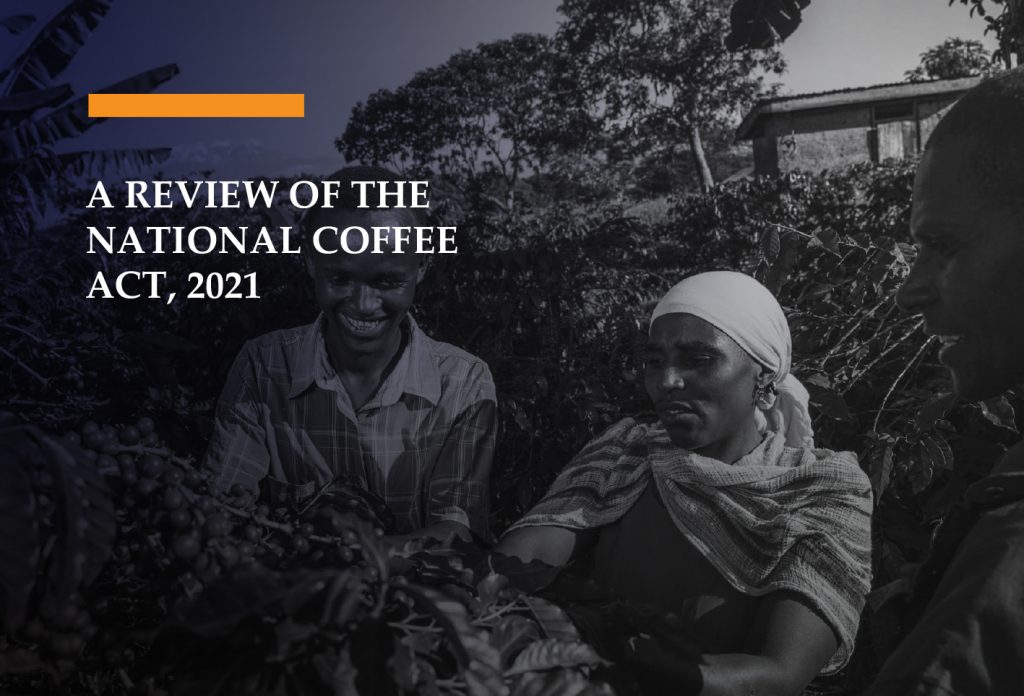Introduction
The Coffee Act was passed to repeal and replace the Uganda Coffee Development Authority Act, Chapter 325. In the long title, it is an Act intended to, continue in existence of the Uganda Coffee Development Authority, to provide for the Uganda Coffee Development Authority, promote and oversee the coffee subsector, to provide for the authority to regulate all on farm and off farm activities in the coffee value chain, to provide for a coffee auction system, and for other related matters.
Among the key regulatory developments ushered in by the Coffee Act are the following:
- Registration of coffee farmers
The Uganda Coffee Development Authority (“Authority”) shall register all coffee farmers in the coffee subsector. The Authority shall establish and maintain a national register of coffee farmers and all persons who at the time of registration or have proof of his or her intention to commence growing coffee within a period of six months, from the date of registration, shall be required to register with the Authority.
The Authority shall, on registering a coffee farmer issue the coffee farmer a coffee farmer’s registration number and there shall be no fees for registration of the coffee farmers.
- Registration and Licensing of coffee chain actors
Registration of coffee chain actors
The Authority shall promote, register and regulate the formation of coffee value chain actors at the various levels of the coffee value chain throughout Uganda.
In this regard, the Authority shall register and maintain the following registers; A pulpery operator’s register; coffee buyer’s register; coffee grading register; coffee processor’s register; coffee exporters register; brewer’s register; coffee store or ware house operator’s register; coffee huller operator’s register and a coffee extractor’s register.
Registration of processing factory.
The Authority shall register every coffee processing factory. The Authority shall, on ascertaining the particulars submitted, issue a certificate of registration to the owner of the processing factory on payment of the registration fees prescribed by the Authority.
The certificate issued under this section is not transferrable and shall be renewed annually on payment of a fee prescribed by the Authority.
Mandatory coffee licensing
Unlike the repealed Act, it is now a mandatory requirement for any participant in the coffee value chain to apply for and obtain the relevant license before engaging in any coffee related activity. Under section 35 of the Act, a person shall not operate any coffee related business without a license.
Coffee License categories
The following are the various license categories that any coffee sector player will have to apply for upon terms and conditions that the authority thinks fit and the examples of the licenses are; A pulpery operator’s license; coffee buyer’s license; coffee grading license; coffee processor’s license; coffee exporters license; brewer’s license; coffee store or ware house operator’s license; coffee huller operator’s license and a coffee extractor’s license.
License application
License applications shall be in a form prescribed by regulations valid for a specific period, for a specific location and issued subject to payment of an application fee prescribed by the authority.
- Warehousing & Coffee exports
Section 54 of the Coffee Act stipulates that a company that intends to warehouse coffee for export shall sign a memorandum of understanding with the authority.
A company with a memorandum of understanding to warehouse coffee for export which warehouses coffee not cleared for export by the authority or tampers with coffee cleared by the authority for export shall have its license cancelled and the coffee shall be confiscated and forfeited to the state.
Nature & substance of the Memorandum of understanding
Whereas the Act does not give guidance on the purpose and nature of the memorandum of understanding envisaged under the law, Section 56 (2) (i) empowers the Minister to make regulations concerning the procedure for importation and exportation of coffee and coffee exports.
The substantive provisions of the memorandum of understanding are likely going to be provided for under the regulations.
- Coffee auction System
Section 52 of the Act enjoins the Uganda Coffee Development Authority to establish a coffee auction system which shall be used as an alternative method to the day-to-day method of selling coffee.
This is expected to potentially add value in the distribution system and create a closer link between growers and roasters.
- Coffee quality control
Types of coffee
The Authority shall under section 58, determine and regulate the types and varieties of coffee to be grown in the different parts of Uganda.
Grading & Certification of Coffee
The Authority under section 40 of the Act, shall in collaboration with the body responsible for standards develop coffee standards. The Authority shall grade and certify all coffee grown or marketed in Uganda.
For the purposes of this section, the Authority shall take into account international and regional coffee grading and certification standards issued by the International Coffee Organization or any other international and regional coffee standards organization.
- Levy on Coffee exports
The Authority shall levy a charge not exceeding two percent on the Free on Rail or Free on Truck or other form of acceptable contract price of the export of coffee.
- Offences
Section 53 provides for offenses and penalties under the Coffee value chain. Any person who does the following;
- Operates an unregistered coffee nursery or coffee seed garden;
- sells or distributes of substandard or diseased planting materials;
- harvests or is found in possession of immature cherries or strips of a coffee tree;
- roasts or packages non-coffee material as coffee;
- poorly stores wet cherries or heaps coffee leading to mold formation;
- sets up a store or warehouse that does not meet the requirements for storing coffee;
- being a processor, does not have a husk chamber or store;
- operates a huller without a license or without an approved structure;
- deals in coffee for internal marketing without a license or in contravention of the Act.
- operates a coffee processing factory without a license;
- handles or processes wet coffee with a moisture content above fourteen percent;
- dries coffee on the bare ground;
- processes coffee without a valid license;
- tampers, replaces, removes or is in possession of a security seal of the authority without authorization;
- replaces inspected coffee with uninspected coffee;
- boils, contaminates or rough hulls coffee;
- adulterates coffee or is in possession of adultered coffee which means mixing coffee of different types or mixing coffee with non-coffee materials;
- denies access to or blocks an inspector or staff of the authority or fails to render any reasonable assistance to an inspector;
Commits an offence.
Under section 56, where an offence specified under the act is committed by a body corporate, every director and employee of that body corporate shall also be taken to have committed that offence, and where the body corporate is a firm, a partner of that firm shall also be taken to have committed that offence unless he or she proves that the offence was committed without his or her knowledge, or that he or she exercised due diligence to prevent the commission of the offence.
- Regulations
The Minister is empowered under section 57, on the recommendations of the Board of the Uganda Coffee Development Authority, to make regulations for better carrying into effect the provisions of the act.
Conclusion
The Act has introduced fundamental sweeping regulatory changes to the entire coffee subsector and the coffee value chain. While it has extended the coverage of the regulatory framework amidst some initial public uproar, the ultimate power of the new law to increase the quality of the Coffee value chain will be determined by the quality and extent to which the yet to be passed regulations will made. As with laws whose substantive power is left for regulations, the devil in this Coffee Act will be in the detail that the Regulations will usher in.



